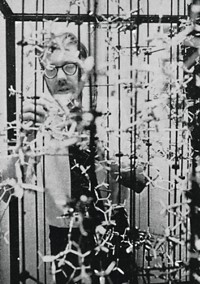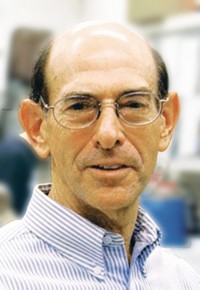Advertisement
Grab your lab coat. Let's get started
Welcome!
Welcome!
Create an account below to get 6 C&EN articles per month, receive newsletters and more - all free.
It seems this is your first time logging in online. Please enter the following information to continue.
As an ACS member you automatically get access to this site. All we need is few more details to create your reading experience.
Not you? Sign in with a different account.
Not you? Sign in with a different account.
ERROR 1
ERROR 1
ERROR 2
ERROR 2
ERROR 2
ERROR 2
ERROR 2
Password and Confirm password must match.
If you have an ACS member number, please enter it here so we can link this account to your membership. (optional)
ERROR 2
ACS values your privacy. By submitting your information, you are gaining access to C&EN and subscribing to our weekly newsletter. We use the information you provide to make your reading experience better, and we will never sell your data to third party members.
People
Two Share Wolf Prize
2007 chemistry prize honors ribosome, photosynthesis advances
by Stu Borman
January 15, 2007
| A version of this story appeared in
Volume 85, Issue 3
The Israel-based Wolf Foundation has awarded its 2007 Prize in Chemistry to an Israeli structural biologist for work on the ribosome and to a physicist in California for research on photosynthesis. The awardees, professors Ada Yonath of the Weizmann Institute of Science, Rehovot, Israel, and George Feher of the University of California, San Diego, will share the $100,000 prize.
Yonath is cited by the Wolf Prize chemistry committee for helping to decipher the mechanism by which the ribosome translates the genetic code into proteins, for obtaining structures of the ribosome and ribosome-antibiotic complexes, and for discovering cryocrystallography, a technique that minimizes or eliminates damage to radiation-sensitive biomolecules. According to the committee, "Yonath's strength, persistence, skills, and daring in approaching problems considered insurmountable at the time let her explore new experimental and conceptual approaches later adopted by the scientific community at large."
Feher is being honored by the committee for his discovery of ENDOR-not the forest moon on which the rebel alliance won a victory against the galactic empire in "Star Wars," but rather electron-nuclear double resonance spectroscopy. ENDOR, a technique used to obtain structural information on polycrystalline and amorphous materials, has aided the study of biological systems that contain paramagnetic centers. The committee also cited Feher for work leading to a better understanding of the structure and function of photosynthetic reaction centers, the protein complexes at which photosynthesis is carried out in bacteria and other organisms.
The Wolf Prizes are sometimes referred to as the Israeli Nobels. Five are awarded annually to outstanding scientists and artists "for achievements in the interest of mankind and friendly relations among peoples." In addition to the chemistry prize, prizes are given in agriculture, mathematics, medicine, physics, and the arts, with one category skipped each year.
The prizes will be presented on May 13 by the president of Israel in the Knesset, home to Israel's Parliament, in Jerusalem. The Wolf Prizes were established by the late German-born inventor, diplomat, and philanthropist Ricardo Wolf.






Join the conversation
Contact the reporter
Submit a Letter to the Editor for publication
Engage with us on Twitter